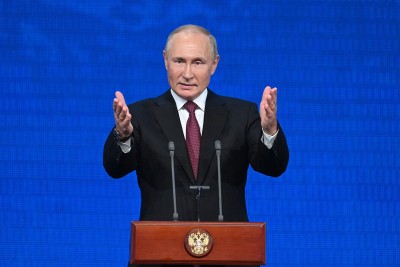Austria Could Grant Vladimir Putin Immunity for Peace Talks Despite Arrest Warrant
Amid ongoing tensions in the Ukraine war, neutral Austria could play a decisive role as a mediator. As confirmed by the Austrian Foreign Ministry, it would be prepared to host possible peace talks between Russia and Ukraine. A possibility was also raised of granting Russian President Vladimir Putin immunity despite an international arrest warrant.
 An international arrest warrant has been issued for the Russian president, with Putin's arrest expected upon his arrival in Austria. / Picture: © Wikimedia Commons / www.kremlin.ru - The President of the Russian Federation [CC BY-SA 3.0 (https://creativecommons.org/licenses/by-sa/3.0)]
An international arrest warrant has been issued for the Russian president, with Putin's arrest expected upon his arrival in Austria. / Picture: © Wikimedia Commons / www.kremlin.ru - The President of the Russian Federation [CC BY-SA 3.0 (https://creativecommons.org/licenses/by-sa/3.0)]
Ukrainian President Volodymyr Zelensky has suggested Austria as a possible venue for a summit meeting. However, this proposal raises questions due to the arrest warrant issued against Putin by the International Criminal Court (ICC) in The Hague. Since March 2023, Putin has been accused of being responsible for the illegal deportation of children from the occupied territories of Ukraine to Russia – an act that constitutes a war crime.
As a signatory to the Rome Statute of the ICC, Austria would actually be obliged to arrest Putin upon his entry into the country. However, as reported by "DerKurier", a spokeswoman for the Austrian Foreign Ministry has stated that headquarters agreements with international organizations based in Vienna, such as the Organization for Security and Cooperation in Europe (OSCE), could offer a solution. These agreements provide immunity for conference participants.
Mongolia ignored arrest warrant
Austria would not be the first ICC member state to ignore the arrest warrant. In September 2024, Vladimir Putin traveled to Mongolia – also a signatory to the Rome Statute – and was not arrested there. The country was subsequently reprimanded by the International Criminal Court. Another notable case was Putin's visit to South Africa in 2023. South Africa, also an ICC member, had previously invited Putin to the BRICS summit. Following international pressure and legal disputes in South Africa, Putin did not travel there. Instead, he participated via video conference, while Foreign Minister Sergey Lavrov represented him on site.
The ICC is the only permanent international body that can prosecute individuals for genocide, war crimes, and crimes against humanity. It is important to note that the court can take action in cases where national judicial systems are unwilling or unable to do so. Russia does not recognize the ICC's authority and has repeatedly emphasized that the arrest warrant is meaningless. Nevertheless, it has significantly restricted Putin's travel options, as he cannot travel to all countries that would have to arrest him.
Austria's decision to consider possible immunity highlights the dilemma between international legal obligations and the desire to find diplomatic ways to end the war. Whether and when such a meeting might take place remains to be seen. However, the offer from Vienna signals a willingness to take on a mediating role and facilitate dialogue.



